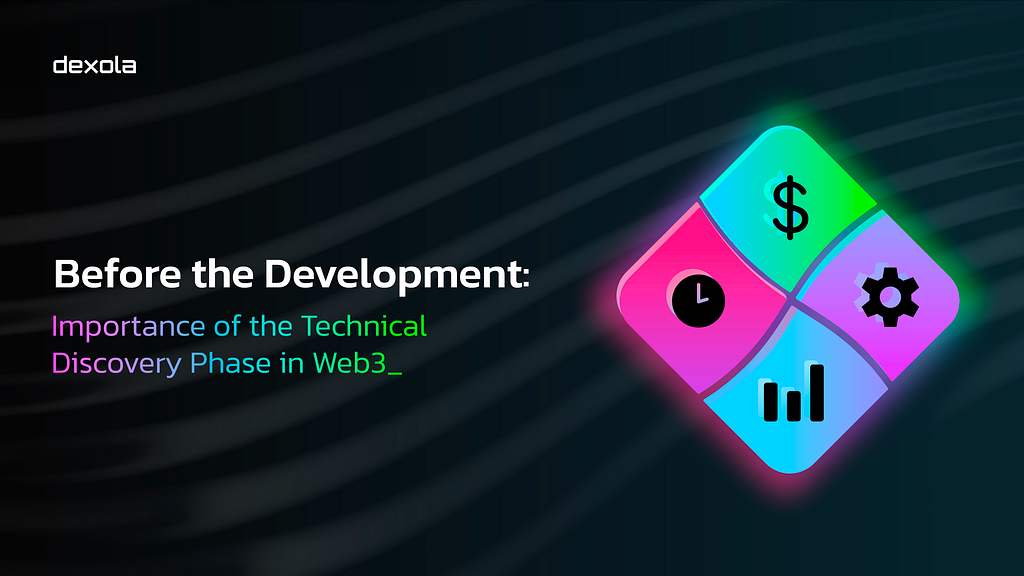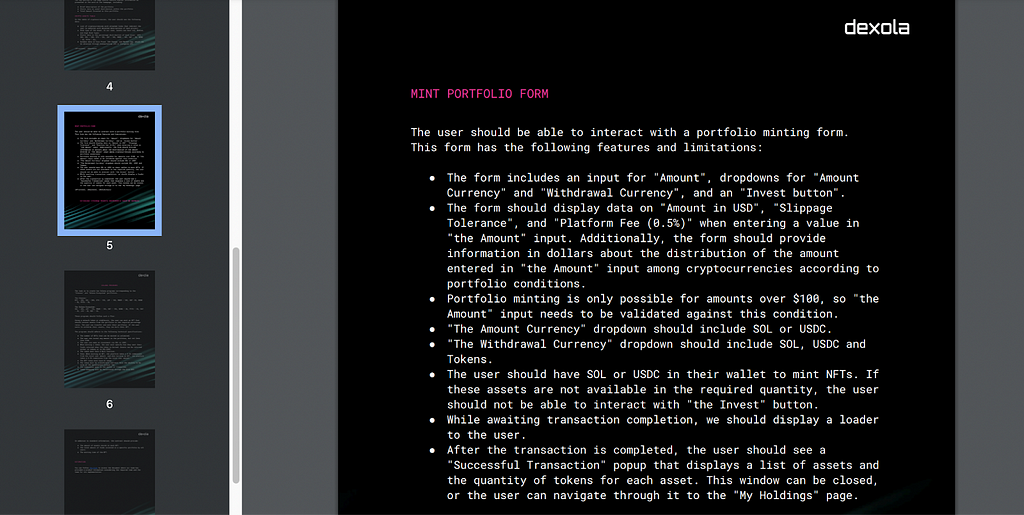Before the Development: Importance of the Technical Discovery Phase in Web3

In the world of Web3 development, bridging the gap between a client’s expectations and the final product is often a significant challenge. This disconnect usually arises from vague requirements or a lack of detailed planning in the early stages.
Dexola proposes starting with a Technical Discovery Phase to tackle this issue head-on. This phase is crucial for clarifying goals, managing resources efficiently, and identifying potential risks early on.
By meticulously planning each stage of the project, we ensure that every detail aligns with the client’s vision, ultimately delivering a high-quality product that meets their expectations. This approach makes Dexola the perfect tech partner for emerging web tech startups.
Core Components of the Technical Discovery Phase in Software DevelopmentThe phase ensures that a project is thoroughly researched and planned before any coding begins. It is all about understanding requirements, devising a technical implementation plan, and calculating the time and cost involved. By doing so, it minimizes risks and increases the likelihood of project success.
Once the draft plan is approved, we move forward with detailed development. Throughout this process, we maintain constant communication with the client and, at the end of the Discovery Phase of the project, provide complete technical documentation.
Here’s a more solid description of the stages involved in the Technical Discovery Phase in software development, specially tailored for Web3 projects:
- Goal Setting and Implementation Methods: We start by analyzing the project’s technical requirements and objectives. This involves understanding the context and defining key metrics for success. For instance, for a cryptocurrency wallet, this could mean security standards, user interface requirements, and transaction speed.
- Technical Functionality and Architecture: We conduct a thorough analysis of the technical requirements and business needs to develop the project’s functionality. This stage includes considering specific features like blockchain integration, wallet security, and user authentication mechanisms.
- Building Stages: Once the system components are identified, we break them down into technical subtasks. This allows us to estimate time and resource costs accurately for each stage. For instance, tasks might include designing the user interface, developing the backend infrastructure, and implementing secure transaction protocols.
- Calculation of Time and Estimated Final Budget: We perform a detailed assessment of the resources required for each subtask. This involves using specialized tools and consulting with contractors to provide an accurate timeline and budget. For a Web3 project, this might include costs for blockchain development, security audits, and compliance checks.
- Risk Management: We identify and assess technical risks that could impact project implementation. This involves allocating time and resources to mitigate these risks, ensuring potential technical issues are anticipated and resolved early on.
By completing the software development Discovery Phase, we deliver a precise technical plan within 1–3 weeks depending on the scope of the client’s project. This phase optimizes the workflow, reduces the risk of resource misallocation, and ensures clear expectations are set, preventing the need for project reevaluation down the line.
Benefits of the Technical Discovery Phase by DexolaWhen Web3 businesses partner with Dexola, they gain several advantages that significantly boost their project’s success:
In-Depth Project Understanding: We prioritize understanding your business, its goals, and its needs in detail. This ensures we set the right direction from the start and achieve the specific results you expect.
Transparency and Communication: Throughout the Discovery Stage, we maintain constant communication with our clients. This allows us to quickly respond to changes and keep you informed every step of the way.
Personalized Approach: We customize our strategies to fit the unique features and requirements of each project. This tailored approach helps optimize outcomes and meet your specific needs.
Cost Efficiency: Our Discovery Phase service is entirely free if you choose Dexola for the technical implementation of your project. However, even if you decide to proceed independently, our thorough documentation provides universal solutions to ensure your product’s success.
By collaborating with Dexola during the Discovery Phase, startups can expect a well-structured, efficient, and transparent process that lays a solid foundation for their project’s success.
Discovery Phase Use Case by Dexola for BiscuitBiscuit is a decentralized platform designed to simplify investments in financial NFTs and portfolios, enabling users to engage in instant staking with just one click. Dexola has created comprehensive documentation for the company to prepare the idea for implementation, ensuring a smooth transition from concept to execution.

The Biscuit team decided to focus on the problem of new cryptocurrency investors who often struggle with selecting the right assets and creating optimal portfolios. This challenge, or problem, is due to the complexities of conducting thorough research and the limitations of centralized storage systems.
To solve this problem, Biscuit aims to develop a platform that provides ready-made NFT portfolios across various domains, including artificial intelligence and DeFi. By offering this solution, users can effortlessly create an NFT with one click and immediately start staking assets to earn profits.
Dexola’s Technical Solution for Biscuit
As part of the Discovery Stage, the Dexola team proposed the following technical solution for the Biscuit project:
- System Structure
- A comprehensive architecture including frontend on React.js, Next.JS, Wagmi, SCSS, GraphQL, backend on NodeJs, TypeScript, Subgraph, and blockchain components on Solidity, Hardhat, ethers.js.
- We pointed out the need to use other tools, such as GitHub, to ensure reliable source code management.
2. Functionality
- We proposed the core features including a main portfolio offering page, pages with detailed information about each portfolio, and an NFT creation form.
- Clarification of requirements for each function, including interaction with cryptocurrency wallets and work with data on the composition of portfolios.
3. Integration with Cryptocurrency Wallets
- The ability to authenticate users through various wallets such as Phantom, MetaMask, Solflare, and Ledger, as well as through the Wallet Connect service.
- We pointed out the importance of integration with the Solana network for interacting with wallets and completing transactions.
4. Form for NFT Creation
- We designed the form for NFT creation, including validation of entered data, display of information about costs and commissions, and the ability to select the currency and investment amount.
- Clarification of the conditions for creating an NFT, including the minimum investment amount, verifying the presence of the necessary assets in the user’s wallet, and displaying the status of the transaction.
5. Solana Programs
- Proposal for building two Solana programs corresponding to the “Classic” and “Solana Ecosystem” portfolios for the creation, transfer, and “burning” of NFTs.
- Clarification of the logic of the programs, including the distribution of assets in the created NFTs, the ability to select a currency when burning NFTs, and charging fees for transactions.
These suggestions helped the Biscuit team and many others validate the technical plan and move forward with the project with confidence in its effectiveness and functionality.
Final ThoughtsThe Technical Discovery Phase in software development is the key stage in achieving the success of your Web3 project. The Dexola team offers not only technical expertise and experience but also an individual approach to each client, providing a deep understanding of the project and transparent communication at all stages.
Our service helps you to structure your work process, minimize risks, and immediately form clear expectations for your future product.
Before the Development: Importance of the Technical Discovery Phase in Web3 was originally published in Coinmonks on Medium, where people are continuing the conversation by highlighting and responding to this story.
